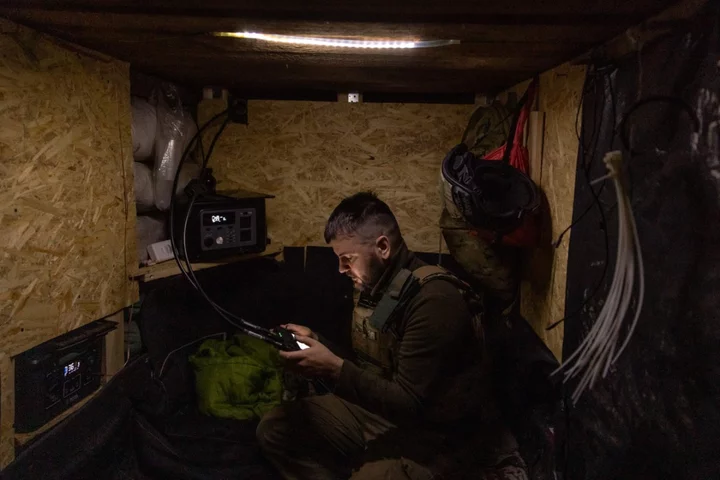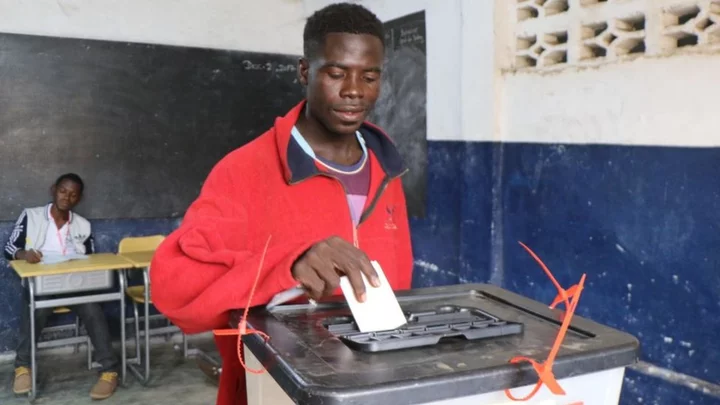
Missing Irish-Israeli woman's relatives 'only have hope'
Irish-Israeli woman Kim Damti, 22, has been missing since the Supernova music festival attack.
2023-10-10 15:50

Ukraine Recap: Drones Launched Against Three Southern Regions
Ukraine’s military said air-defense forces downed 27 out of 36 drones launched by Russia overnight against the southern
2023-10-10 15:22

Zainab Abbas: Pakistani cricket commentator leaves India after backlash
ICC said Zainab Abbas left India for personal reasons amid local media claims she was forced to go.
2023-10-10 14:47

Destroying Hamas a priority for Israel, ambassador says, after militant group threatens hostages
Israel is repeatedly pounding Gaza with deadly airstrikes, displacing more than 100,000 people and sending waves of injured Palestinians to overwhelmed hospitals, as military leaders follow through on orders of a "complete siege" of the densely populated coastal strip.
2023-10-10 14:27

Putin could restart banned nuclear tests as Russian parliament ordered to review treaty
Vladimir Putin has given Russian lawmakers 10 days to find how best to revoke Moscow’s ratification of a critical nuclear treaty which bans Russia from testing atomic weapons shortly after he suggested the possibility of resuming such testing. The chair of the State Duma (lower house of parliament) Vyacheslav Volodin and other parliament heads laid out a deadline for Russian lawmakers to study the de-ratification of the Comprehensive Nuclear Test Ban Treaty (CTBT) option until 18 October, a statement from the Duma read. Mr Volodin said revoking the ratification on testing nuclear weapons will be in Russia’s national interest as he discussed the matter with parliamentary leaders on Monday. If revoked, Russia will signal a warning to the US that Moscow can fundamentally change the assumptions of post-Cold War nuclear planning. This comes just four days after Mr Putin said that Russia’s nuclear doctrine – which determines the conditions in which he would press the nuclear button – did not need updating. But he added that Russia could look at revoking ratification of the significant nuclear treaty to bring it into line with the United States, which has signed but not ratified the pact. The US has previously said Russia’s pulling out from the treaty will endanger "the global norm" against nuclear test blasts. In a U-turn from Mr Putin’s remarks on Friday, his envoy to the Comprehensive Nuclear Test Ban Treaty Organization (CTBTO) said Moscow would revoke its ratification of the pact. Western security analysts have said such a step from Moscow will be a reminder that it still possesses the world’s largest nuclear arsenal at a time when it is locked in a standoff with the West over Ukraine. If Russia goes ahead with a nuclear test, it could encourage others such as the US or China to retaliate in a similar test and renew a fresh wave of nuclear arms race between the global superpowers. These nations have not carried out nuclear tests after the Soviet Union collapse in 1991. Russia’s actions have sparked concern, said Robert Floyd, head of the Comprehensive Nuclear-Test-Ban-Treaty Organization. He added that he is in touch with senior Russian officials to make the case for continued ratification, something he said was in the interest of humanity as a whole. Mr Floyd had requested a meeting with "key leaders" in Moscow as soon as possible, he said. "The CTBTO operates a global monitoring system which can detect a nuclear test explosion anytime, anywhere," he said in a statement. "Banning nuclear testing remains essential to preventing the spread of nuclear weapons and to safeguarding current and future generations from the harmful effects of explosive nuclear testing." The de-ratification move can take “Russia and the world backward to a dangerous era of tit-for-tat nuclear threats”, said Daryl Kimball, executive director of the Washington-based Arms Control Association. Read More Ukraine-Russia war – live: It is in Russia’s interests to inflame war in the Middle East, says Zelensky Russia reports coolant leak in backup line at space station and says crew not in danger Ukraine advances in east and south with more ‘partial success’ even as rain muddies battlefield Ukraine repels Russian attacks on five fronts as Putin resorts to old weaponry and reserves Satellite images show spike in border activity as North Korea ‘supplies weapons to Russia’ for Ukraine war
2023-10-10 14:19

Woke up to sounds of explosion: UK doctor in Gaza
British doctor Abdul Qadir Hammad was in Gaza a day before Hamas launched its deadly attack on Israel.
2023-10-10 14:17

World Mental Health Day: 5 ways to beat anxiety and change your life
Anxiety is something that touches most of us, to a greater or lesser extent. Although it may just be a temporary blip for some people, for many, anxiety is a diagnosed condition that blights their lives. Indeed, Mental Health UK estimates more than one in 10 people in the UK are living with an anxiety disorder – that’s over eight million of us. And World Mental Health Day (October 10) is a chance to address the topic, agrees clinical psychologist Dr Kirren Schnack – author of the new book Ten Times Calmer: Beat Anxiety And Change Your Life. “It’s a reminder that mental wellbeing is just as important as physical health,” she says, pointing out that anxiety disorders are among the most widespread mental health issues globally. “Clinically, I’ve seen more and more people coming in with anxiety issue. The pandemic has played a significant role in this surge, introducing unprecedented levels of uncertainty, fear, and social isolation. At the same time, global economic instability and job losses have intensified stress and anxiety for many,” Schnack adds. “The widespread use of digital technology and social media has exposed people to a constant stream of alarming news and comparison-driven content that also feeds anxiety.” Schnack explains that anxiety disorders include generalised anxiety disorder (GAD), which causes chronic worry and hinders decision-making; health anxiety, where there’s an excessive preoccupation with diseases and illness; panic disorder, which is marked by sudden overwhelming panic attacks; and social anxiety, which leads to avoidance, isolation and low confidence. “They can blight daily life through physical symptoms, cognitive impairment, social isolation, disrupted routines, and emotional distress,” she says. Schnack suggests these five ways to combat anxiety problems and find calm… 1. Calm your stressed nervous system Anxiety places significant strain on the nervous system, Schnack explains, but there are simple daily practices that can help alleviate this stress. One is focusing on breathing, extending your exhale longer than your inhale. To do this, Schnack says you need to inhale gently through your nose, pause for a few seconds, then exhale slowly and deeply, ensuring an extended exhale. “A longer exhale helps by increasing the activation of the body’s parasympathetic nervous system, which counteracts stress hormones, lowers heart rate, and reduces overall physiological stress,” she says. She suggests around three to five of the breaths are repeated on multiple occasions throughout the day, and stresses that consistency is key. “Recognise that if anxiety has been a longstanding presence, it will take time and patience to restore your nervous system’s sense of safety and stability.” 2. Address anxious thoughts Schnack explains that anxiety often generates anxious thoughts that can seem like undeniable facts that are often dwelled on and reacted to, thus intensifying anxiety. “To break free from this cycle, it’s crucial to consciously confront and process these anxious thoughts,” she says. To do this, write a simple record, noting the date of your anxious prediction, describing what it was, and then, after a specified time like a day or two, return to what you’ve written and confirm whether the prediction was accurate by marking it as ‘yes’ or ‘no’. When the prediction doesn’t materialise, make a note of the actual outcome. Revisit the record, especially during anxious moments, and count the yes or no entries to reflect on your progress. “This practice trains your mind to adopt a broader, less anxious perspective,” explains Schnack. 3. Stop over-focusing on anxiety“People struggling with anxiety often find it challenging to shift their attention away from anxiety symptoms, leading to a persistent preoccupation that can worsen their problems,” says Schnack, who explains that this preoccupation can lead to excessive self-analysis, fixation on physical sensations or repetitive thoughts, and being hypervigilant. To shift your attention away from overwhelming anxiety, Schnack suggests trying this exercise: choose a colour, such as blue, and actively seek out blue objects in your surroundings. Name them out loud, and count them as you move around, possibly describing the item too. “Strive to maintain this focus for a few minutes, switching to different colours if necessary. Again, consistency is crucial, so make an effort to practice this regularly whenever anxiety hijacks your attention,” she advises. 4. Learn to tolerate uncertainty Recognising and addressing uncertainty is vital when dealing with anxiety, Schnack stresses. “You can’t resolve every uncertainty in life – the key lies in enhancing your ability to tolerate uncertainty so you can reduce your anxiety,” she explains. “Being more accepting of the fact that things may not always go as planned or that the future is uncertain can be incredibly liberating.” To help build resilience against uncertainty, Schnack advises people to take a moment to slow down and not immediately engage in reactive behaviour demanded by uncertainty, such as checking, Googling or avoiding things. Instead, she says, note your feelings, observing what uncertainty is doing to your mind and body, and write out an affirmation such as: ‘I’m feeling anxious because I’m uncertain about… My typical response to uncertainty is to engage in… behaviour. I recognise this only worsens my anxiety. My goal is to distance myself from anxiety rather than gravitate towards it. I can sit with the feeling of uncertainty for as long as I can, and build on this time until I get better and better at it.’ 5. Gradually face your fearsConfronting your fears is an effective way to overcome them, observes Schnack, although this can often feel overwhelming. “When you confront your fears, you’re essentially acting in opposition to your anxious thoughts and what anxiety is telling you. This process weakens anxiety’s grip on you, and when the actual outcomes don’t align with your anxious predictions, your mind can naturally adjust its thinking.” She suggests starting with small steps and gradually building up. So, for social anxiety, gradually start by saying a simple sentence or asking a basic closed question, and gradually building up from there. For health anxiety, gradually reduce and eliminate excessive online researching about illness and diseases, starting with small-time durations and then building on that. For panic disorder, gradually spend more time in places you typically avoid, starting with short durations like 30 seconds, then a few minutes, and gradually keep increasing the time. “Remember to repeatedly face your fears to make meaningful progress – it’s not just a one time thing,” adds Schnack. Ten Times Calmer: Beat Anxiety And Change Your Life by Dr Kirren Schnack is published by Bluebird, priced £16.99. Available now. Read More Alternative veg to grow for next season How to spot if your child is struggling with their mental health – and what to do next Does your pillowcase make a difference to your skin and hair health? Sarah Jessica Parker channels Carrie Bradshaw on the red carpet in mismatched shoes Does your pillowcase make a difference to your skin and hair health? As transphobic hate crimes rise by 11% in a year, how to be a better ally
2023-10-10 14:16

Treasuries’ Best Day Since March Driven by Signs Fed May Be Done
Bond investors are starting to bet the worst-ever rout in US Treasuries may soon be over. US 10-year
2023-10-10 13:59

Irish budget: Tax cuts and billions in increased spending
Updated plans for a sovereign wealth fund are also expected in Tuesday's budget.
2023-10-10 13:51

Ukraine advances in east and south with more ‘partial success’ even as rain muddies battlefield
Ukrainian soldiers fighting off Russian attacks in the eastern battlefield achieved “partial success” in the past 24 hours while troops in southern Ukraine inflicted over a hundred Russian casualties, officials said as the war was close to clocking 600 days. The troops secured partial success near Andriivka, a small Ukrainian village captured last month along with the nearby locality of Klishhiivka, said Ilia Yevlash, a spokesperson for Ukraine‘s eastern group of forces. "We are repelling constant attacks near Klishchiivka and Andriivka,” the spokesperson told national television. "Every day we are making headway in the Bakhmut sector. We are talking about hundreds of metres at a time that we are liberating from our enemies and strengthening our positions. It is, however, too early to talk about achieving concrete goals,” he said. The “partial” headway in territorial advance was also reported in southern Ukraine by general Oleksandr Tarnavskyi, commander of forces in the south. “We have partial success west of Verbove. During the past 24 hours, the enemy carried out eight airstrikes, 18 combat encounters, and also launched 455 artillery barrages,” the top military official said on his Telegram channel. Verbove is one of the cluster of villages that Ukraine is targeting, with the larger town of Tokmak as the next large target. The Ukrainian units of rocket troops and artillery from the Tavria Air Defence Forces launched 795 fire missions during the day, he said. “The total losses of the enemy amounted to 147 people,” he said but did not give details about the injuries, deaths, and capture of Russian soldiers as prisoners of war. Three Russian ammunition depots were also bombed, along with two tanks and an artillery system, he said. This comes amid first signs of deterioration in battlefield conditions due to weather as Russian military bloggers said rainfall has worsened visibility in southern Ukraine. Experts monitoring the war said changing weather conditions will hinder the reconnaissance drone operations on both sides. “One Russian milblogger claimed that the ground has become muddy and obstructs tracked vehicle movement, though another milblogger claimed that the ground has not yet become muddy enough to inhibit vehicle movement,” said the Institute for the Study of War in its latest assessment on Monday. It added that exact conditions likely vary along the frontline, though weather conditions are generally worsening.It cited Yevlash’s report stating that the Russian forces are relying less heavily on aviation and drone activity in the Kupiansk-Lyman direction due to heavy rainfall. The Russian accounts of fighting claimed its forces thwarted Ukrainian attacks near Bakhmut and inflicted heavy casualties in strikes on Ukrainian positions outside the city. Now on the edge of entering its fifth month, Ukraine’s counteroffensive aims to secure control of areas around Bakhmut in order to recapture the town, which was seized by Russian forces in May after months of heavy battles. Read More Ukraine-Russia war – live: It is in Russia’s interests to inflame war in the Middle East, says Zelensky Zelensky says Russia trying to incite war in the Middle East Satellite images show spike in border activity as North Korea ‘supplies weapons to Russia’ for Ukraine war Ukraine repels Russian attacks on five fronts as Putin resorts to old weaponry and reserves Russia reports coolant leak in backup line at space station and says crew not in danger
2023-10-10 13:27

Liberia elections: Voters head to polls as George Weah faces Joseph Boakai
President George Weah is facing a strong challenge from the opposition in his bid for a second term.
2023-10-10 13:23

US Police Shoot, Kill Driver in Chinese Consulate Incident
US police shot and killed a person who crashed their car into China’s consulate in San Francisco on
2023-10-10 13:18
